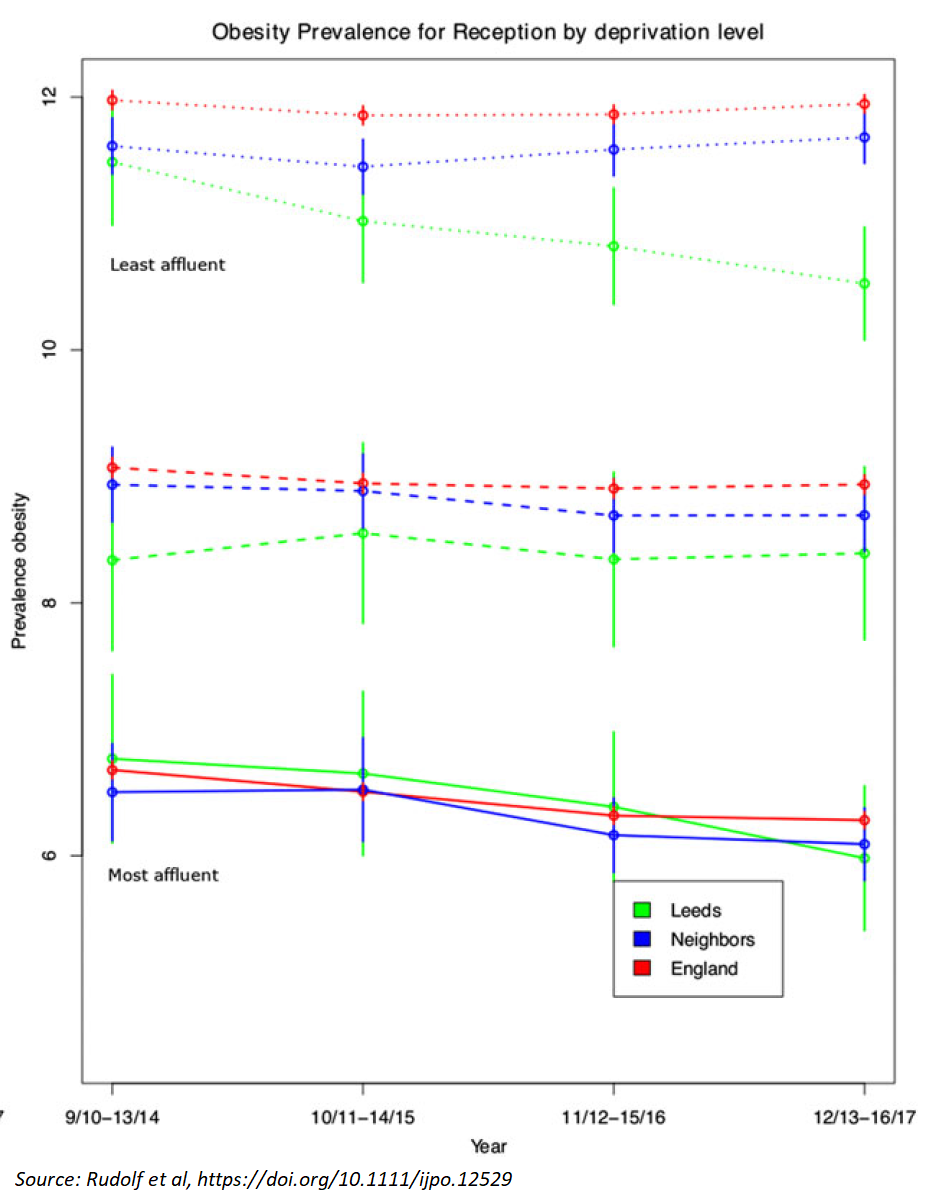
Leads in Leeds for Reducing Childhood Obesity
 Has the England’s city of Leeds cracked the code for reducing childhood obesity? A new study presented at ECO 2019 and published in Pediatric Obesity certainly has some people trumpeting success. Says senior author Susan Jebb:
Has the England’s city of Leeds cracked the code for reducing childhood obesity? A new study presented at ECO 2019 and published in Pediatric Obesity certainly has some people trumpeting success. Says senior author Susan Jebb:
It is sometimes too easy to think nothing is working, this shows something can be done. What we need to do now is understand exactly why Leeds has seen the progress it has and also to look at the experience of other areas. They could hold the key to tackling child obesity.
It’s especially nice to see data that suggests a stronger effect for economically disadvantaged groups.
Pride in Success
This is a genre of obesity studies that we see quite frequently. Researchers comb through data looking for outliers. Where are people bucking the trend for obesity prevalence? When you look hard enough and long enough, you will find population clusters where the discouraging trend of steadily rising obesity doesn’t apply. Then the challenge becomes figuring it out.
Success has many fathers but failure is an orphan. Tom Berry quickly stepped forward in the Guardian to claim paternity for this success. “My organisation helped Leeds lower child obesity. Here’s how to do it nationwide,” he writes. The HENRY program promotes healthy lifestyles and parenting skills for families with very young children.
A decade ago, the Leeds city council set a priority on reducing obesity in this age group.
Other Explanations
In their paper, Jebb and her colleagues correctly note how difficult it can be to figure out exactly what’s going on here:
By the nature of this observational study using routine data collection, we cannot ascertain how actions taken in Leeds might relate to the differences observed with its nearest neighbours or England as a whole.
In other words, maybe this HENRY program has been a glorious success. Or maybe not. But the fact is that this program could and should be tested in a rigorous study.
Getting to the Truth
In the absence of controlled data, we must consider the possibility that other factors could explain what we’re seeing in Leeds. For one thing, we note that pupils are invited to participate in weighing. But they can opt out. That option would seem to be especially attractive for heavier pupils. And with everyone turning up the noise level on fighting obesity, we see the possibility for a systematic bias. With ever more focus, larger children might feel even worse about stepping on the scale.
Since the paper omits a careful discussion of this and other limitations, we cannot know. Confirmation bias and optimism bias can play mean tricks on us when we’re looking for good news.
It’s useful to have some leads from Leeds on reducing childhood obesity. But the next step is essential – doggedly pursuing the objective truth of what’s working or not.
Click here for the paper in Pediatric Obesity. You can find further perspective here and here.
Leeds Opera North Children’s Chorus Event, photograph © Donald Judge / flickr
Subscribe by email to follow the accumulating evidence and observations that shape our view of health, obesity, and policy.
May 3, 2019

May 03, 2019 at 10:40 am, Mary-Jo said:
I truly believe if we are persistent and consistent with the unobtrusive, yet proactive attention and access to children through programs such as in Leeds, then we will continue to see decreased incidence and prevalence. I didn’t do a formal study (I tried to, wrote a protocol and all, but never found a ‘home’ to execute the study) but was astonished at how receptive and effective and popular(!) it was when I worked in international schools, with PE teachers, school nurses, and school health teachers educating, counseling, and monitoring kids who had nutritional challenges. It wasn’t exclusively for children with obesity as we addressed kids with food allergies, food intolerances, undernutrition, kids who wanted to go vegan, diabetics, but we ended up helping so many children AND their families with weight. It started out because of language barriers — in continental Europe when height and weight checks are done, if a child is over or under appropriate percentiles on growth charts, they are required to go to the GP for weight and nutritional counseling and I was asked to do the dietary counseling as many families didn’t speak Dutch, French, or Russian. As a pediatric nutritionist, I was delighted to do it and I myself saw that this was a great way to provide access to care for children who, otherwise, wouldn’t seek it or get it, even if they tried. Being able to monitor a child for the 3 to 4 years was very special and effective. Being able to assess a child who was not having a weight issue, but rather going through a growth spurt and alternatively, picking up an imminent weight issue before it developed to disease levels, was great. I’m not saying this is THE strategy that would work, but I thought it was worth investigating. Often, necessity is the mother of invention.